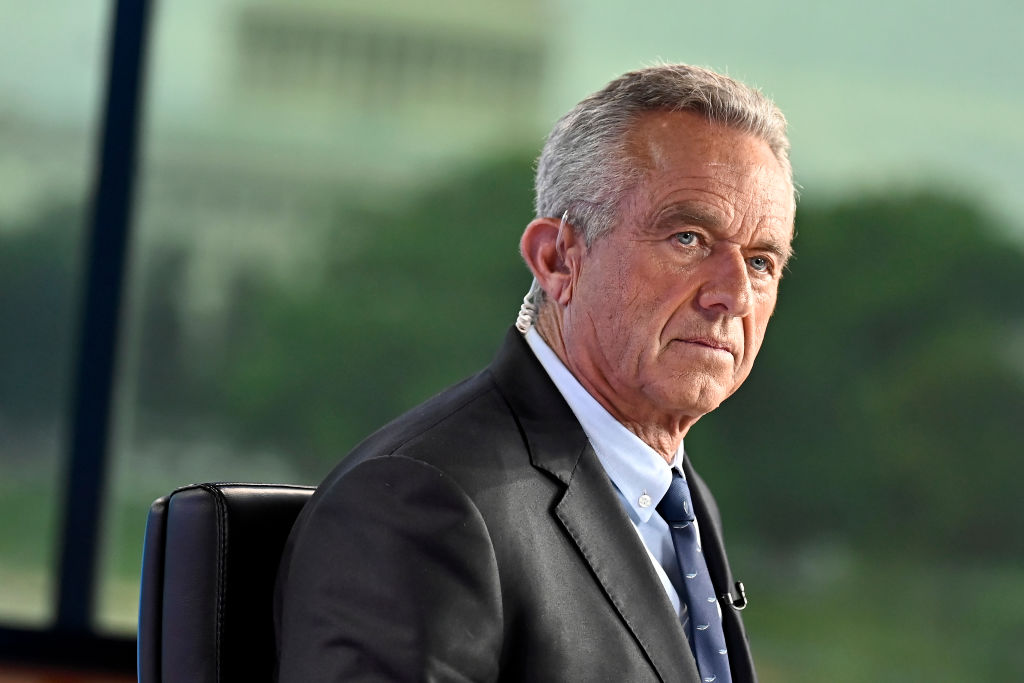Flipping the script on the teachers unions.
The Nexus of What’s Next

Media, Big Tech, and Pharma are allied with national governments in an information war to dictate what goes in our bodies.
Early on in the pandemic, we were told—by government, the media, Big Tech, and Big Pharma—that an equally dangerous contagion was spreading in parallel to the novel coronavirus. An “infodemic” of “misinformation” about the virus, and about the official response to the virus, was putting lives at risk and threatening to prolong the crisis further. Publications like National Geographic drew comparisons with “decades” of climate change “denial,” flying in the face of scientific “consensus,” and noted how experts in and out of government were drawing together sophisticated techniques to ensure people had access to information they could trust, without falling prey to “dangerous” narratives that licensed non-compliance.
Although it was obvious from the start that government, the media, Big Tech, and Big Pharma were working in tandem to control the flow of information and guide public behavior in a way that had no precedent, the depth of this collaboration, and the methods employed, took some time to become clear. Investigations by brave individuals, publications, and organizations like Big Brother Watch provided vital information. They revealed that huge amounts of data, including personal data that should have been off-limits to government, were being collected and monitored, and even how military-grade psychological-warfare techniques were being used on the public through units such as the British Army’s secretive 77th Brigade and the Canadian Joint Operations Command.
As we near the fourth anniversary of the start of the pandemic, none of this is news—or, rather, none of it should be. It should be no surprise, either, to learn that the parties to this brave new world of information control have not surrendered their powers or ceased to collaborate with one another now that the pandemic is officially over.
According to a recent report published in UnHerd, vaccine manufacturer Moderna now operates its own intelligence service, which it uses not only to gather massive amounts of data and produce detailed briefings against potential threats to its business, but also to coordinate with government, Big Tech, and the wider medical profession to “shape narratives.” “Moderna is spying on you,” runs the headline.
We were also told during the pandemic that things would never be quite the same again. These revelations about Moderna’s activities show that one of the key features of our “new normal” is an ever-closer nexus between government, the media, and corporations. We should be in no doubt that this will come to dominate and define citizenship in the years to come, and set the very limits of individual freedom unless there is a determined pushback against it. We should also be in no doubt about who benefits and how. As a billion dollar business, Moderna infringes foundational liberties of thought and speech in the name of profit and nothing else, whatever high-flown motives its representatives may profess.
Moderna’s new “Global Intelligence Division” is run by Nikki Rutman, a 20-year veteran of the FBI. During the pandemic, she acted as a liaison between the FBI and Moderna as part of the U.S. government’s Operation Warp Speed, which aimed to develop COVID diagnostics and treatments and bring them to market as quickly as possible. Operation Warp Speed netted Moderna nearly a billion dollars, out of a total of $4.9 billion in contracts to produce 300 million doses of an mRNA vaccine for COVID.
Other former law enforcement people have since joined Moderna to work alongside Rutman in the Global Intelligence Division. They produce regular reports on emerging threats, color-coded to indicate their severity. Low-risk threats are monitored, but no action is taken. For medium- and high-risk threats, “recommendations” are issued to “stakeholders” about how to counter them (more on this in a moment).
Lee Fang and Jack Poulson, the journalists behind the story for UnHerd, were able to access a number of reports focused on high-profile individuals, including Elon Musk, Novak Djokovic, and Russell Brand. Musk was flagged for circulating a video on Twitter that ridiculed the claim that the COVID vaccines are “100% safe and effective.” Though Musk’s video wasn’t flagged for inaccuracies or false statements, the report warned that his video would help “sow distrust in credible sources on vaccine safety and effectiveness.” Any public questioning of the safety or efficacy of the COVID vaccines, even based on official statements from government and the vaccine makers themselves, is too much questioning for Moderna, it seems.
Tennis star Novak Djokovic became a target for the Division when he won the Moderna-sponsored U.S. Open in 2023, after a year spent in purdah for his refusal to be vaccinated. Djokovic was vilified for his refusal to be vaccinated against COVID-19, which prevented him from playing at the U.S. Open in 2022 and defending his title at the Australian Open. As a result, his victory at the 2023 U.S. Open was seen by many as a vindication of his refusal to compromise on his beliefs, even at massive cost to his otherwise faultless career as a sports icon and role model. Moderna’s report on him noted, “The optics of Djokovic, whose vaccine opposition barred him from competing in the 2022 U.S. Open, returning to and winning the Moderna-sponsored competition bolsters anti-vaccine claims that vaccines—and mandates—are unnecessary.” News about Djokovic’s win was deemed to pose a “high risk” for disinformation.
In one sense, this heightened vigilance from Moderna is understandable. It’s easy to forget that, before the pandemic, Moderna was just another biotech company, developing marketable products with venture-capital funding, but with no great promise. Then, suddenly, with its success in developing one of the first commercial mRNA vaccines, it was worth $100 billion, and its chief executive, chairman, co-founder, and president were all billionaires. While the company now has 45 treatment and vaccine products in development, 38 of which have reached clinical trials, it still has just a single product to sell to the public and justify its value: the mRNA vaccine for COVID.
A little over a year after Moderna’s vaccine received FDA approval, the pandemic was finally ended in the U.S. by Joe Biden, months after similar declarations were made elsewhere. Demand for COVID vaccines has now collapsed; although having regular booster shots remains a badge of honor for a certain kind of hardcore libtard. Moderna posted third quarter losses this year of $3.63 billion, or $9.53 a share, with sales of its vaccine down 44 percent on the same period in 2022.
Speaking on CNBC, Moderna’s CEO, Stéphane Bancel tried to minimize the losses, of course, and spoke about company’s reordering to meet new priorities, which include various new vaccines and therapeutics in development. “During the pandemic, we were obsessed about scaling up manufacturing to make as many doses as we could to help as many people as we could. And now that we’re moving into an endemic setting, it is important to resize the company,” Bancel said. The company’s CFO, Jamey Mock, expects next year to be the absolute “low point” for sales for the company, followed by a return to organic growth in 2025, as the company’s second product, a vaccine for respiratory syncytial virus, launches. Vaccines for particular cancers, heart disease, and other conditions are targeted for release by 2030.
It isn’t a wonder, then, with its only available product being a vaccine, and most of its future offerings also being vaccines, that Moderna is aggressively monitoring public opinion about vaccines and influences on public opinion about vaccines. You could call this market research, something every sensible company does. If you make vaccines you need to know how people feel about vaccines. On the back of its research, in late spring Moderna launched a bold new campaign welcoming us to the “mRNAge,” in which we are told that taking mRNA vaccines should be a routine part of a healthy lifestyle. “Spikevax that body!” the narrator says.
But Moderna is going much further than just monitoring opinion for the purposes of better advertising. As the Unherd report makes clear, the company has moved into the realm of actively controlling the flow of information upon which decision-making is based. Moderna is now an arbiter of who can speak and who can’t, and what may permissibly be said. This is bad news, and it portends far greater ills if it goes unchallenged. This isn’t just about Moderna.
We shouldn’t be naïve about what advertising, in the traditional sense, is and does. Edward Bernays published his second book, Crystallizing Public Opinion, a full century ago now. Nor should we be naïve about the extent to which pharmaceutical companies use and have used advertising, especially in the U.S. but also elsewhere, to shape public opinion and drive behavior—that is, consumption of their products. The harm—the iatrogenesis—this can cause is plain to see.
An example I often like to cite, from Ivan Illich’s mighty book Limits to Medicine (1975), concerns the role of advertising in convincing Chilean mothers to give up breastfeeding for new formula products in the 1960s and ‘70s. These were products mothers had—and have—absolutely no need of, since breastmilk is nutritionally superior to formula and, what’s more, it’s free; today there are breastmilk-sharing groups on social media for women who can’t produce it themselves, and superior alternatives can easily be made at home. In conjunction with the Chilean government, formula makers used advertising to present their products to urban middle class women and peasants alike as the “right” option for modern, liberated women as opposed to the backward, low-class practice of breastfeeding. The campaign worked spectacularly—for the formula makers at least. The wholesale adoption of baby formula led to an epidemic of infant malnutrition, including deaths, and necessitated the creation of a totally new infrastructure of child care to deal with the effects of formula-feeding. Mothers and infants were now captive to the medical industry in a way they had never been before. This is a pattern that has been repeated across the world, for which formula-makers like Nestlé have been subject to long-term international boycotts.
In many cases, the harm is an unintended consequence, but in others it arguably isn’t. A notorious recent instance of the latter case is the Sackler family’s catastrophic marketing of Oxycontin, as chronicled in Patrick Radden Keefe’s book Empire of Pain.
What Moderna is doing with information is something new, though. The company’s links to organizations like the Public Goods Projects (PGP) and Talkwalker, revealed in the UnHerd report, are of particular note. On its website, PGP describes itself as a “public health nonprofit specializing in large-scale media monitoring programs, social and behavior change interventions, and cross-sector initiatives.” This is typical NGO gibberish. What it means, basically, is that PGP finds ways to access massive amounts of data, uses algorithms and special software to look for specific patterns, and then provides its findings to powerful companies and government for them to act on. Talkwalker performs an identical service, using its “blue silk” AI platform to monitor over 150 million websites in 200 countries for pertinent data.
During the pandemic, PGP was allowed a “backdoor” into Twitter, giving it real-time access to every single tweet on the platform for the purposes of data mining and analysis on the widest possible scale. At this time, it was working directly with Moderna and Twitter to identify “misinformation” and help shape Twitter’s policies on COVID and its treatments. This included providing Twitter with lists of accounts to boost or censor. Remember that significant numbers of people, including prominent health experts like Dr. Robert Malone, were removed from the platform for questioning the official narrative in ways that ranged from expressing doubts about the origin of the virus to advocating the use of generic drugs like ivermectin and hydroxychloroquine as treatments for COVID, on the basis of well-established science and experimental protocols used across the world. This blacklisting had serious personal and professional consequences that ramify to this day. In return for its services, Twitter recommended PGP to the Department of Homeland Security to contribute to its task force on combatting “vaccine misinformation.”
PGP was also involved in distributing talking points and advice about how to deal with “vaccine misinformation” and hesitancy to almost 50,000 healthcare professionals across the U.S. In the same vein, in recent months it has embarked on a new scheme with Moderna and the American Board of Internal Medicine to develop an “Infodemic Training Program” for healthcare workers.
It’s not clear whether other vaccine manufacturers or pharmaceutical companies are also running similar infowar operations to Moderna. If I were a betting man, I’d say yes. Pfizer, Novavax, Johnson and Johnson, and AstraZeneca were all just as intimately involved with government, the media, and Big Tech during the pandemic as Moderna was. They will have learned the same methods and drawn the same conclusions. In time, whistleblowers may come forward from other Big Pharma companies and confirm these suspicions.
The real danger is not that it’s fast becoming impossible to have a reasonable discussion anywhere about the rewards and risks of vaccination—that horse has well and truly bolted—or that real world harm will be caused by allowing drug manufacturers to help censor critics of their products in the digital public square—again, that horse has well and truly bolted—but that the example of the pandemic is going to be used to create new health-based forms of social control. Like the new forms of social control pioneered during the pandemic, they will be subtle and sometimes even imperceptible, but unlike the pandemic, they may never come to an end.
Let’s look at climate change. It’s a tenet of the “climate crisis” narrative that animal agriculture is one of the main drivers of climate change, through the carbon emissions required to produce the vast quantities of grain that are fed to most livestock, and the emissions the animals themselves produce (cow burps and farts, mainly). Reducing or even eliminating meat and dairy consumption is therefore an essential, non-negotiable part of saving the planet, and it must happen as soon as possible. The EAT Foundation, which essentially functions as the food arm of the World Economic Forum, has even come up with the world’s first global diet, in conjunction with the Lancet, which it calls the “Planetary Health Diet.” The diet sets out daily calorie intake for a typical citizen of the near future, with precise macronutrient targets drawn almost entirely from plant-based sources like whole grains, legumes, and nuts. Within these guidelines, at best you’ll get a thin sliver of meat and a quarter of a small egg a day. The beauty of the Planetary Health Diet, according to its creators, is that not only will it save the planet, but it will also save us individually, since we know that consumption of animal products is linked to almost all the prevailing chronic diseases of our age.
There’s just one problem for advocates of dietary change on a global scale: most people, certainly in the developed world, simply don’t want to give up eating animal foods. This is clear from the dismal ongoing performance of the “alternative protein” industry, whose chief players like Beyond and Impossible continue to post record losses and lay off significant numbers of staff, and from consumer-attitude surveys and research studies. A survey conducted during the pandemic, for example, revealed that 73 percent of Australian men would rather lose ten years of their life than give up meat.
Actually, there’s another problem too: plant-based diets aren’t better for us than animal-based ones. Anybody with even a basic understanding of human evolution, history, and physiology knows that. And despite decades of bad industry-funded science and the near total hegemony of the climate-change movement, this inconvenient truth continues to find its way, blinking, into the light. Last year, a study in the International Journal of General Medicine reported that increased meat consumption, and not increased carbohydrate (i.e., crop) consumption, predicted greater life expectancy in data taken from more than 170 countries worldwide. The authors of the study noted that most research that throws a “negative spotlight on meat consumption in the human diet” reaches misleading conclusions because other variables aren’t properly controlled. When those variables are controlled, the conclusions are very different.
So, what if government, in conjunction with the media, Big Tech, and corporations, started making it harder and harder to talk freely about the many benefits of consuming animal products and to dispute the supposed role of animal agriculture in causing climate change? Would that work to help reduce consumption of meat and dairy? Quite possibly. Reducing freedom of speech about COVID-19 on the internet certainly made it easier to convince people that the only answer was to hide in their homes, put away the horse paste, and wait for new experimental vaccines to be developed.
In my view, it’s unlikely that governments will ever ban meat consumption outright, as some fear. That would be seen as too radical a step, too interventionist—too Big Brother. What’s likely to happen, instead, is that less radical methods will be employed to make people see meat as environmentally and therefore socially harmful. Studies have already shown that the most effective ways to get people to choose plant-based alternatives to animal products, apart from reducing choice at the point of consumption, is to put social pressure on consumers about the negative effects of animal products. Shame-based marketing is already a feature of many campaigns for plant-based foods; for example, “oat-milk” maker Oatly’s ghastly “Help Dad” campaign, in which hopeless fathers are berated by their snotty Zoomer kids for wanting a glass of milk, as opposed to oat-flavored water. U.K. scientists recently researched whether adding graphic cigarette-style labelling to meat would reduce consumption, and found that it did, by between 7 percent and 10 percent. While this might not seem like much, the study was short term and didn’t consider what the effects of longer-term conditioning would be, let alone long-term conditioning in a wide variety of settings.
Other more direct measures short of an outright ban may also be used in conjunction with this new messaging. At the recent COP28 summit, lobbyists for the alternative protein industry were suggesting that governments should now directly subsidize alternative proteins to make them more affordable, and governments including the British government have talked for some time about the possibility of a “meat tax” or even a sliding-scale “carbon tax” on various products, including meat and dairy, in line with their carbon footprints.
This is just one scenario, but a plausible one in my opinion. It might start with warnings on animal products and disclaimers on YouTube videos and social media posts about the benefits of eating eggs or drinking milk, which is bad enough. But soon we’d end up with users being deplatformed and labelled “right-wing” for making any suggestion that plant-based nutrition is not superior to the animal foods our ancestors have eaten, and flourished by, for hundreds of thousands of years.
In fact, this is exactly what the Changing Markets Foundation—another public health non-profit just like PGP—is advocating right now, in its newly released report, “Truth, Lies and Culture Wars: Social Listening Analysis of Meat and Dairy Persuasion Narratives.” The report analyzed 285 million social media posts and identified nearly a million containing “misinformation” about plant-based diets, mainly on Twitter but also on Facebook. The report emphasizes the key role of “right-wing commentators and politicians,” including Tucker Carlson and carnivore-diet proponent Shawn Baker, in spreading “misinformation” about plant-based diets. The report also claims that the meat and dairy industry is probably directly funding such “attacks.” (I’m afraid I’ve yet to see a single cent from the American Egg Board for the sterling work I did in my latest book, The Eggs Benedict Option….) The report calls for, among other things, public-education campaigns and “fact-checking initiatives,” moves by social media to identify and remove “harmful content,” greater transparency from the meat and dairy industry about their marketing practices, and tougher regulations on political advertising (because advocating for meat and dairy consumption is now largely identified as a “right-wing” cause).
Everything about this report, from the language and targets—“misinformation,” “harmful real-world consequences,” “right-wing commentators and politicians”—to the big-data methods employed and the recommendations, bears the mark of the pandemic response. The mold has been set.
Of course, the report says nothing about the billion-dollar interests behind the plant-based agenda, about the fact that virtually every government, every NGO, every asset-management and investment firm, every major corporation advocates for the abandonment of traditional agriculture in favor of a new global system that is totally within the hands of corporate food producers like Cargill, Tyson Foods, and Unilever. To say that this position is non-political is a fraud cloaked in a deception. But as we know from three years of “trusting the science,” depoliticization is one of the most sinister, but also successful, ruses of power today.
The American Mind presents a range of perspectives. Views are writers’ own and do not necessarily represent those of The Claremont Institute.
The American Mind is a publication of the Claremont Institute, a non-profit 501(c)(3) organization, dedicated to restoring the principles of the American Founding to their rightful, preeminent authority in our national life. Interested in supporting our work? Gifts to the Claremont Institute are tax-deductible.
Efforts to force Americans onto trains are largely pointless and counterproductive.
The world’s largest transportation providers are suffering from a nasty case of COVID whiplash.
When the intelligence community wants to recruit punk rockers, who are society’s rebels?
An examination of the priestly caste of the leftist religions.
RFK Jr. is making all the right people furious.






